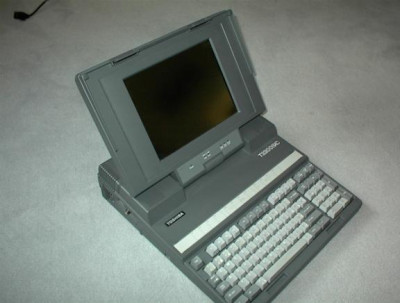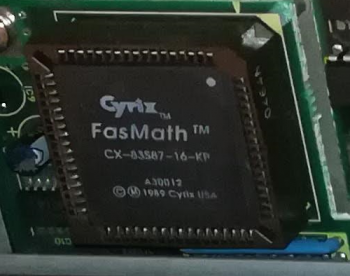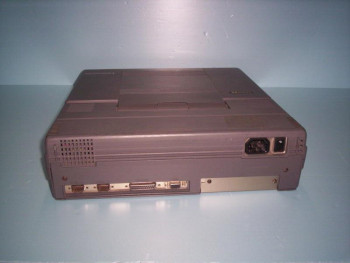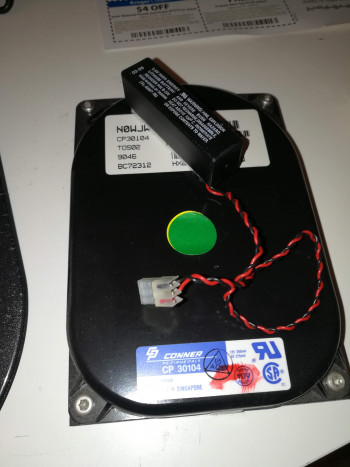This is an old revision of the document!
T3100 | T3100e | T3100SX | T3200 | T3200SX | T3200SXC
Toshiba T3200SXC
A durable workhorse of it's time, the T3200SX and T3200SXC portable computers were manufactured and targeted primarily as desktop computer replacements for businesses. Of course, at the time of the release, there existed smaller laptop computers, but none of these even came close to the power, durability and expandability of this Toshiba computer.
The T3200SX and T3200SXC computers are siblings. The only differences are that the SXC has a color flat panel screen and a faster central processing unit (20 MHz as opposed to 16 MHz). The graphics adapters are the same, both systems are VGA capable, and support resolutions up to 640×480 with 16 colors.
| Technical Specifications | |
|---|---|
| Year Announced | 1989 |
| Processor | 20MHz Intel 80386SX-20 |
| Coprocessor | Optional Intel or compatible 80387SX-20 math co-processor |
| RAM | Standard 1 MB of RAM, expandable up to 13 MB. |
| Hard disk | Comes standard with a Conner CP-model IDE hard disk, either 40 MB or 120 MB (BIOS selectable) |
| Floppy disk | 3,5“ 1.44 MB High Density (HD) diskette drive |
| Video Adapter | VGA compatible WD 90C21 chip with 256 KB video RAM with VGA output. |
| Internal display | 11.2” flat panel thin film transistor (TFT) color liquid crystal display (LCD) with a 640 by 480 native resolution. |
| I/O Ports | 1x VGA, 1x Parallel, 2x RS232C Serial, 1x DIN keyboard connector. |
| Internal expansion slots | 1x full size 16/8-bit ISA slot 1x half-size 8-bit ISA slot |
| Power Supply | Universal. Works with 110V/220V and 50/60 Hz power. |
| Dimensions | 370 x 395 x 99 mm (W x D x H) |
| Weight | 7.9 kg (17.4 lbs) |
| Other features | |
| Software | |
|---|---|
| Operating System | Toshiba MS-DOS 3.3 |
System Expansion
Hard disk
Toshiba T3200SXC came with either a 40 MB hard drive, or an 120 MB hard drive. The system has a standard IDE interface to connect to the supplied Conner CP hard disk. Most (if not all?) Toshiba T3200SXC computers are locked to specific hard disk part numbers, so you cannot upgrade it easily. If you try using a different hard disk, the computer will refuse to detect and use the hard disk, unless the hard disk identifies itself with a part number starting with “CP” which stands for Conner Peripherals. Older BIOSes will allow you to use any hard drive, but will still use the disk settings for the hard drives that were originally supplied with the system. In this case, you can override the settings with Anydrive, found under Files and Resources.
I have received a report that T3200SX ROMs are not compatible with T3200SXC. I don't unfortunately carry any T3200SXC ROM dumps that allow the use of any hard disk, but you can use any XT-IDE adapter in this case, such as the XT-CF-lite from Lo-Tech. TexElec carries these in stock in the US. This card bypasses the built-in IDE controller completely and replace it with a CF card.
These are the drive configurations supported by all BIOSes:
| Model | Native C/H/S1) | Translated C/H/S2) | Capacity | Seek time | ||||||||
|---|---|---|---|---|---|---|---|---|---|---|---|---|
| C | H | S | C | H | S | Unformatted | Formatted | |||||
| Conner CP-30003) | 1045 | 2 | 40 | 980 | 5 | 17 | 40 MB | 42 MB | 28 ms | |||
| Conner CP-30444) | 1047 | 2 | 40 | 980 | 5 | 17 | 40 MB | 42.8 MB | 25 ms | |||
| Conner CP-301045) 6) | 1524 | 4 | 39 | 762 | 8 | 39 | 120 MB | 122 MB | 19 ms | |||
Search these hard drives on eBay 7)
If you're lucky, your computer has the older BIOS, and will ignore the part number and will let you boot from any IDE drive as long as you manually override the BIOS settings in software using ANYDRIVE or any other BIOS overlay software, like OnTrack. However, if you have a newer BIOS, the computer will not detect the drive unless it's made by Conner (it's IDE identifier string must start with the letters “CP”). If you have an older BIOS that is not locked to original Conner hard disks, I would like to hear from you! We need a copy of the BIOS ROM so we can make other T3200SXC's capable of using newer hard drives.
CPU upgrades and overclocking
I've been informed that on the T3200SX it is possible to replace the CPU with a TX486SLC upgrade. Credits for this discovery go to mohhingman. Thank you!
RAM memory upgrade
The computer uses 30 pin SIMMs to add more system memory, but it's not completely standard. The computer was shipped with 1 Mb (megabit) or 2Mb memory chips that were 80ns (or faster) with parity. There are six slots in total and the banks are used in pairs, so at least two are needed. Standard configuration comes with 2 MB of RAM preinstalled, upgrade models come with 4 MB. The memory is upgradable up to 13 MB 8)
ISA Expansion Slots
If you remove the rear panel, you will be able to access the ISA expansion slots. The computer has one 16-bit full-length ISA slot and one 8-bit half-length ISA slot. The system also has a proprietary 16-bit Toshiba expansion slot. I have my computer set up with an 16-bit Sound Blaster 16 and an 8-bit 3Com Etherlink III (3C509) for networking. However, at least this site 9) points out, that some later 3Com Etherlink III cards do not support 8-bit ISA.
Math coprocessor (FPU)
The computer can be upgraded with an math coprocessor (FPU). The FPU doesn't come as standard, but the computer has a provision for an added Intel 387 FPU.
AT keyboard connector
The computer has a DIN connector for a AT style keyboard but it may be covered by a plastic cap. Please see the DIN keyboard connector page for more information.
CMOS clock battery
Lithium 3.6V battery supplied. A T3200SX/120 I had came with an original Tadiran TL-5207 3.6V battery. It had a plastic container package, that actually just contained a Tadiran TL-5151 3.6V 1/2 AA lithium battery. Please see gallery for more pictures.
Questions and Answers
Q: What is the PRN-A-B Switch on the side?
A: Toshiba offered an external 360Kb disk drive as an option. This plugs in to the parallel port connector but is not a parallel device. Setting the switch to PRN enables the printer port, setting it to A tells the machine there is an external disk drive and you want it to be A drive. Setting it to B tells the machine there is an external disk drive and you want it to be B drive. Setting it to A would allow you to boot 360Kb boot disks.
Unless you have the Toshiba external floppy – always set this to PRN. 10)
Q: My computer gives me a configuration error when I turn it on
A: If the CMOS battery is empty, you will be prompted with the following error when you power on the machine.
Invalid configuration information - please run SETUP program Strike the F1 key to continue. F2 to run the setup utility
Please refer to instructions here:
How do I boot my T3200SX with an empty CMOS battery
Q: How can I access the built-in BIOS ?
A: Press CTRL + SHIFT + F10 when the computer powers on. If this does not work, you may use the TEST3.EXE utility, a little program by Toshiba which will open up the BIOS settings from a DOS environment. You might want to include this utility in your computer recovery disk. See below for files that apply to this type of machine, or view all files at the files and resources section.
Q: I am still unable to access the BIOS.
A: When the computer BIOS battery runs empty, it will clear all BIOS settings and will prompt you to review the system settings on power-up. This may be used to your advantage to get into BIOS. To force this behavior, disconnect the clock battery entirely. Wait for a few minutes and power up the computer again. The computer will ask the user to review the default settings. Please refer to How do I boot my T3200SX with an empty CMOS battery
Q: My computer does not hold settings or time
A: You probably have an empty BIOS battery. The battery holds volatile information in a CMOS chip like information about your BIOS settings and system time. When the battery runs out, the information will be lost. You can still use your computer by going into BIOS settings and accepting the defaults (see above).
Q: How do I replace the computer BIOS battery?
A: The BIOS battery is located on the system board. The correct voltage for the battery is 3.6V. You can replace it with either an original part, or alternatively, you can replace it with a 3.0V CR2032 coin cell battery. In this case you should buy a CR2032 holder, a CR2032 lithium battery and a diode. The diode is required to avoid charging the battery. Take the old battery connector and its wires, solder the coin cell holder to the wires and solder the diode in series as such:
[PC] - - - - [|<] - - - - [+ BATT -] - - - - [PC]
You may search for CR2032 battery holders including leads using this eBay affiliate link
Q: How do I upgrade the Hard Disk?
A: It depends on the BIOS version of your Toshiba portable (see below for instructions how to check the BIOS version). Most (if not all?) Toshiba T3200SXC BIOSes are restricted to CONNER hard-drives of either 40 or 120 megabytes size. On boot-up, the BIOS queries the IDE controller for hard-drives. depending on the BIOS type, one of two things will happen:
- Older Toshiba BIOS
- The computer will detect any drive and just assume it's a 40 MB disk (regardless of it's actual size).
- New Toshiba BIOS
- The computer will only detect a drive manufactured by Conner. It will assume it's a 40 MB drive (regardless of it's actual size). If you have a different drive than Conner, your computer will simply refuse to detect the hard disk. The model/part number of the disk must start with the letters 'CP' (Conner Peripherals) for it to be detected.
You have a couple of options:
- If you have the older BIOS:
- Your computer should detect any hard disk, but the computer will assume it's a 40 MB drive and the setting can't be changed in BIOS. However you can still boot from it, but you'll only see up to 40 MB of the disk. To enable larger partitions, you will need to download ANYDRIVE (found in the files section) or any other BIOS HDD overlay program that installs in the MBR of your hard disk, and overrides the BIOS settings to the correct hard drive parameters at startup. Anydrive overrides the BIOS settings so you can use any size hard disk up to 504 MB. You can even use larger disks, but only 504 MB will be usable, if using Anydrive.
- Buy an XT-IDE adapter, such as the XT-CF-lite from Lo-Tech. TexElec carries these in stock in the US. This will bypass the built-in IDE controller completely and replace it with a CF card.
- If you have the newer BIOS, you have a few options:
- As before, you can buy an XT-IDE adapter, such as the XT-CF-lite from Lo-Tech. TexElec carries these in stock in the US. This will bypass the built-in IDE controller completely and replace it with a CF card.
- Buy a Conner hard-disk. The important bit is that the the part number starts with the letters 'CP'. Then use ANYDRIVE to circumvent the BIOS hard-coded drive size limitations.
Note: If you plan to use a drive other than what is supported by your BIOS, I highly recommend a BIOS HDD overlay software, so that you may avoid data corruption.
Q: I upgraded the hard disk on my Toshiba, but now it refuses to boot, or detect the hard disk.
A: If you have verified the replacement disk is fully working, then your computer must be using a BIOS version that only detects and supports Conner hard disks. See above for details.
Q: How do I check the BIOS version?
A: You need to open the portable computer. Remove the four screws from the bottom front of the laptop. Open the screen lid. The keyboard should now lift up starting from the front. You may need to pry the keyboard a little. Once the keyboard is off, remove two screws at the rear of the EM shield between the keyboard and the motherboard. Remove the EM shield. You will see three chips. The one at the bottom right corner is the BIOS chip. I've only seen 003C, 003E and 003F out in the wild. If you have a different BIOS version, please take a picture of it and send it over! If you have the capability to read the BIOS chip, I would appreciate a BIOS image. I will gladly host it on this site.
Files
Documentation
| File | Size | Description |
|---|---|---|
| Toshiba T3200SX - Flyer.pdf | 8.0 MB | Toshiba T3200SX flyer with system specifications. |
| Toshiba T3200SXC - Maintenance Manual.pdf | 3.6 MB | Toshiba T3200SXC maintenance/service manual. |
| Toshiba - Accessory part list.pdf | 26 KB | Toshiba Accessory part list |
Community Guides
| File | Size | Description |
|---|---|---|
| Dumping and Copying Toshiba BIOS ROM | 1.9 MB | How to dump and copy your BIOS from a T3200SX Note: due to the similarities between T3200SX and T3200SXC, this guide should apply to T3200SXC as well, although this has not (yet) been verified. This guide will walk you through the steps needed to dump and/or copy a BIOS ROM chip. This manual is especially helpful if you have a BIOS that doesn't accept custom hard drives, and you want to replace it with a version that does work with custom hard disks. Using the steps in this manual you can replace your BIOS with a BIOS version that allows you to use any hard drive in conjunction with the BIOS version found on this site (see download for t3200sx_bios_003ch.zip). An excellent guide written by High Treason. Note: Use guide at your discretion. You will need a TL866 EEPROM programmer. Highly recommended that you buy a second HN27C1024HG-85 ROM chip and keep your original unmodified and in a safe place. |
Operating System
| File | Size | Description |
|---|---|---|
| toshiba_dos_3_30.zip | 524 KB | Toshiba MS-DOS 3.30/R3C60SC bootable disk image |
Utilities
| File | Size | Description |
|---|---|---|
| tdiagsup_r3ce0.zip | 278 KB | Toshiba Diagnostics and Supplemental Diskette (R3CE0) for MS-DOS 3.30 |
| tdiagsup_dos50.zip | 278 KB | Toshiba Diagnostics and Supplemental Diskette for MS-DOS 5.0 |
| test3.zip | 21.1 KB | TEST3.EXE - Setup program for T3100, T3200, T5100 and T5200 series |
| xchad.zip | 5.3 KB | XCHAD.COM - Set Screen Attributes for T3200, T5100 series |
| HDDID.EXE | 1.6 KB | Identifies parameters of your IDE HDD |
| REBOOT.ZIP | 243 B | Performs cold boot with CTRL+ALT+DEL. |
| ANYDRIVE.ZIP | 13 KB | This program will install inside the primary hard-drive's master boot record (MBR) and while booting, modifies BIOS parameters to accept custom hard-drives (assuming your BIOS version will allow this, see FAQ). To install, make a bootable floppy and copy AnyDrive to it. Boot off the floppy, install AnyDrive on your HDD, then boot from the HDD per usual. The Anydrive documentation describes how to have Anydrive modify BIOS hard-drive settings and still boot from a floppy disk. Assuming you have a custom hard-drive that is larger than 512MB, you can install AnyDrive by running the command “ANYDRIVE 0 2048 16 63”. This will allow you to utilize the first 512 megabytes on the hard-disk. Once installed, just restart the computer. Please note that viruses may overwrite Anydrive from the MBR, so keep your favorite DOS virus scanner and Anydrive handy on a bootable read-only floppy. The reason you can only utilize 512 MB is because of the limitations in the BIOS addressing scheme. For more information, see the included text file. |
| View more files on this support site | ||
BIOS ROM dumps
I do not have any BIOS dumps for T3200SXC. If you have a dump, I'd love to hear from you!
Since this computer is very similar to T3200SX, the BIOSes may be interchangeable. Please see file section for T3200SX for more information.
Gallery
More images
Please see the Toshiba T3200SX page for additional images. T3200SXC is very similar to T3200SX.
Links
The Toshiba T3200SXC and how to disassemble it | Original URL
HighTreason's overview of the Toshiba T3200SX laptop with a in-depth look at the hardware
Baudband - Toshiba T3200SX



